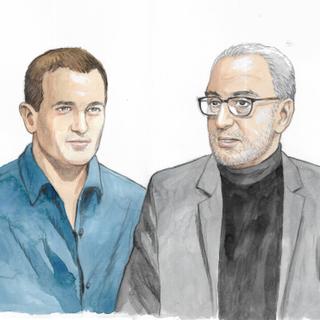


How can the left fight the far right? Two philosophers' ideas for countering nationalism
InterviewIn an interview with Le Monde, Michaël Foessel and Bruno Karsenti analyze the driving forces behind the rise of xenophobic movements – from Marine Le Pen to Donald Trump – that challenge the rule of law, and how progressives can resist them.
A government without a parliamentary majority; a prime minister who is a member of a right-wing party that refused to join the "republican front" to beat the far right; a divided left far from holding power despite having come out on top in the parliamentary elections; and a far right in a kingmaker role, lying in wait and imposing its themes in the public discourse. The current political confusion in France has prompted progressive intellectuals to try to understand this period's blurred ideological lines.
Philosopher and professor at the Polytechnique engineering school, Michaël Fœssel has just published, together with sociologist Etienne Ollion, Une étrange victoire. L'extrême droite contre la politique ("A strange victory. The far right against politics."), which deciphers how "the language of the far right has contaminated public debate." Director of studies at the School for Advanced Studies in the Social Sciences (EHESS), philosopher Bruno Karsenti has published Nous autres Européens ("We Europeans"), together with sociologist Bruno Latour, in which he develops a political philosophy of Europe struggling against "neo-nationalisms." A member of La Revue K, an online magazine whose articles focus on "Jews, Europe and the 21st century," he has also edited La Fin d'une illusion ("The end of an illusion"), a collective book on "Israel and the West since October 7 [2023]." For Le Monde, these two philosophers of emancipation compare their analyses of the political reconfiguration that is currently underway, and suggest theoretical ways out of the reactionary rut.
Is the 'republican front' that sprang up during the parliamentary elections (on June 30 and July 7) just a kind of reprieve before the far right takes power in France?
Bruno Karsenti: The great danger today, in Europe and the world, is the rise of very aggressive nationalisms. This is a huge failure. We had thought that the most relevant political conflict was the one between progressivism and neoliberalism, and we see nationalist reactions spreading out everywhere. The European elections [on June 9] confirmed this trend, but they set a positive impetus in motion, and that's what I'd like us to see, because that's what we can build on. The high turnout was, in and of itself, good news: Indeed, if nationalism is to be countered, the questions have to be asked and played out between the nation and Europe. These elections were a moment of re-politicization, one in which public opinion could finally realize the impossibility of prolonging the Macron era's liberalism; as well as the need for the left, which is seeing social-democracy regain subtance, to be reconfigured.
You have 88.76% of this article left to read. The rest is for subscribers only.
